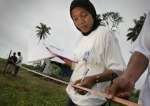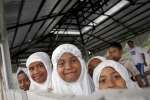- Text size
 |
|  |
|  |
| 
- عربي
Jakarta workshop seeks to strengthen protection at sea in Asia-Pacific
News Stories, 23 April 2014
JAKARTA, Indonesia, April 23 (UNHCR) – Fourteen key countries in the Asia and Pacific regions have agreed to step up efforts to minimize the loss of life at sea while ensuring that people moving irregularly by boat receive the protection they need.
"We are here because the countries of origin, transit and destination that you represent recognize the need for genuine multilateral and regional cooperation, to address in a humane way the ever more urgent and complex challenges presented by mixed maritime movements," said James Lynch, UNHCR's regional representative.
He was addressing delegates at the International Workshop on the Protection of Irregular Movements of Persons at Sea, held in Jakarta on Monday and Tuesday. Co-chaired by UNHCR and the Indonesian government, the meeting was attended by delegates from Afghanistan, Australia, Bangladesh, Cambodia, Iran, Malaysia, Myanmar, New Zealand, Pakistan, Papua New Guinea, the Philippines, Sri Lanka and Thailand as well as the International Organization for Migration. Representatives of Iraq, Fiji and the UN Office on Drugs and Crime also attended as observers.
Some 60,000 people in this region are believed to have moved irregularly by sea in 2013. More than 1,300 people are estimated to have died or been reported missing at sea in 2012 and 2013. The numbers are rough estimates due to the clandestine nature of these movements and the lack of systematic data collection. What is clear is that the problem is growing, as are the challenges facing states in the region.
"The cross-border and complex nature of irregular movement of persons defies national solution. Instead, it demands a comprehensive approach at the national, regional and global level," said Indonesian Foreign Minister Marty Natalegawa. "There is no other recourse but to take a comprehensive and coordinated approach to deal with these issues of common concern. A sense of burden sharing and common responsibility should be the basis for our cooperation at the regional and international levels."
The workshop sought to follow up on the implementation of the "Jakarta Declaration" adopted at a conference last year, with a focus on four main pillars – prevention, early detection, protection and prosecution.
Focusing on protection, workshop participants discussed practical ways to implement a protection-sensitive migration management system that strikes a balance between states' powers to control their borders and their obligations to ensure the protection of the rights of those moving irregularly by sea, in accordance with international law. They also highlighted some of the challenges in identifying a place of safety for disembarkation and finding solutions for those rescued.
At the same time, the group explored ways to build capacity to promote timely search and rescue and reduce the loss of life at sea. Noting that protection starts by saving lives, they stressed the need for enhanced coordination to respond effectively to situations of distress at sea at national and regional levels. They also highlighted the post-rescue challenges of jointly finding comprehensive solutions for the victims' disembarkation.
To facilitate these initiatives, the delegates discussed how they could mobilize and pool resources to support the management of irregular migration and ensure victim protection especially for women and children.
In making a call for collective action, UNHCR's Lynch referred to the Bali Process Regional Cooperation Framework as a blueprint. "We are working hard towards a comprehensive regional response that balances state sovereignty concerns with humanitarian considerations for the protection and welfare of people who move irregularly by sea," he said.
At the workshop's conclusion, delegates recommended several actions that focused on ensuring the full promotion and protection of rights of people rescued and intercepted at sea. UNHCR's Protection Policy Paper on Maritime Interception Operations and the Processing of International Protection Claims could be an important reference for maritime interception operations in the region.
Noting the importance for regional agreements and practical actions, the workshop participants recommended that consideration be given to developing standard operating procedures and undertaking operational exercises that facilitate coordination and cooperation among countries. Common criteria to define distress at sea, place of safety for disembarkation, and how people should be treated based on their identified needs could also be considered.
States were encouraged to participate in a mapping exercise on disembarkation options, a project initiated by the Bali Process Regional Support Office. They were also asked to consider putting in place joint mobile response teams to coordinate disembarkation efforts and help provide timely processing of claims.
Participants recommended to support the Dialogue on Protection at Sea to be hosted by UN High Commissioner for Refugees Antonio Guterres in December, and noted that the workshop's recommendations could be shared with the Bali Process Steering Group and Ad Hoc Group.



















